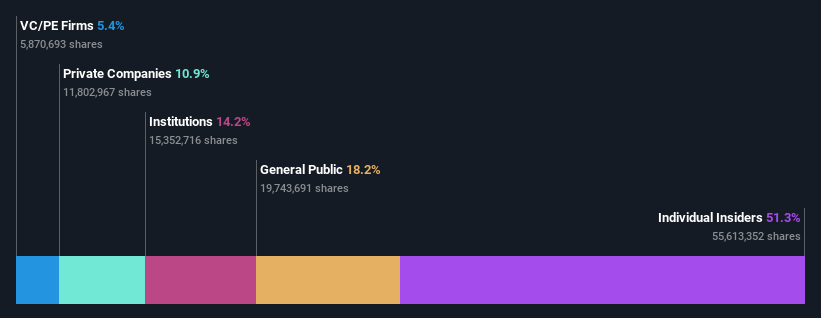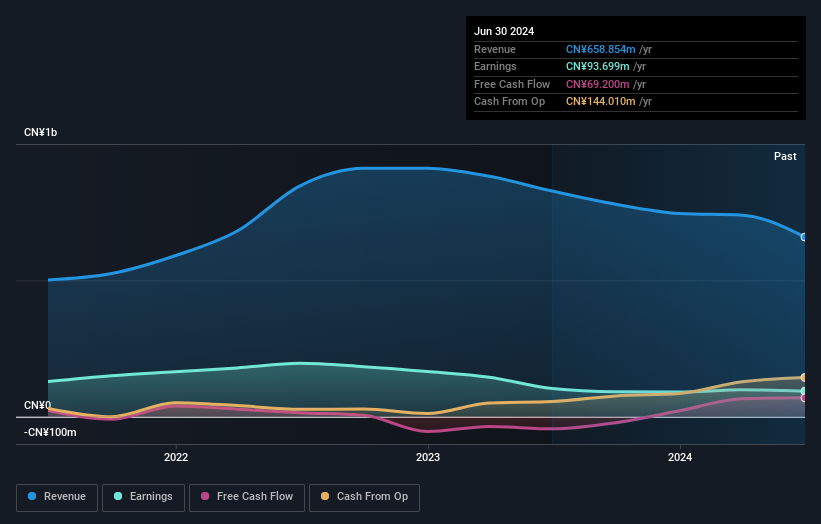- China
- /
- Electrical
- /
- SHSE:688776
Guoguang Electric Co.,Ltd.Chengdu's (SHSE:688776) market cap increased by CN¥966m, insiders receive a 51% cut

Key Insights
- Significant insider control over Guoguang ElectricLtd.Chengdu implies vested interests in company growth
- The largest shareholder of the company is Ya Zhang with a 51% stake
- Institutions own 14% of Guoguang ElectricLtd.Chengdu
To get a sense of who is truly in control of Guoguang Electric Co.,Ltd.Chengdu (SHSE:688776), it is important to understand the ownership structure of the business. We can see that individual insiders own the lion's share in the company with 51% ownership. Put another way, the group faces the maximum upside potential (or downside risk).
As a result, insiders scored the highest last week as the company hit CN¥6.8b market cap following a 17% gain in the stock.
In the chart below, we zoom in on the different ownership groups of Guoguang ElectricLtd.Chengdu.
View our latest analysis for Guoguang ElectricLtd.Chengdu

What Does The Institutional Ownership Tell Us About Guoguang ElectricLtd.Chengdu?
Institutional investors commonly compare their own returns to the returns of a commonly followed index. So they generally do consider buying larger companies that are included in the relevant benchmark index.
Guoguang ElectricLtd.Chengdu already has institutions on the share registry. Indeed, they own a respectable stake in the company. This implies the analysts working for those institutions have looked at the stock and they like it. But just like anyone else, they could be wrong. If multiple institutions change their view on a stock at the same time, you could see the share price drop fast. It's therefore worth looking at Guoguang ElectricLtd.Chengdu's earnings history below. Of course, the future is what really matters.

Hedge funds don't have many shares in Guoguang ElectricLtd.Chengdu. Ya Zhang is currently the largest shareholder, with 51% of shares outstanding. This implies that they have majority interest control of the future of the company. For context, the second largest shareholder holds about 9.4% of the shares outstanding, followed by an ownership of 5.4% by the third-largest shareholder.
While it makes sense to study institutional ownership data for a company, it also makes sense to study analyst sentiments to know which way the wind is blowing. As far as we can tell there isn't analyst coverage of the company, so it is probably flying under the radar.
Insider Ownership Of Guoguang ElectricLtd.Chengdu
The definition of company insiders can be subjective and does vary between jurisdictions. Our data reflects individual insiders, capturing board members at the very least. Management ultimately answers to the board. However, it is not uncommon for managers to be executive board members, especially if they are a founder or the CEO.
I generally consider insider ownership to be a good thing. However, on some occasions it makes it more difficult for other shareholders to hold the board accountable for decisions.
Our most recent data indicates that insiders own the majority of Guoguang Electric Co.,Ltd.Chengdu. This means they can collectively make decisions for the company. So they have a CN¥3.5b stake in this CN¥6.8b business. Most would argue this is a positive, showing strong alignment with shareholders. You can click here to see if those insiders have been buying or selling.
General Public Ownership
The general public-- including retail investors -- own 18% stake in the company, and hence can't easily be ignored. While this size of ownership may not be enough to sway a policy decision in their favour, they can still make a collective impact on company policies.
Private Equity Ownership
With an ownership of 5.4%, private equity firms are in a position to play a role in shaping corporate strategy with a focus on value creation. Sometimes we see private equity stick around for the long term, but generally speaking they have a shorter investment horizon and -- as the name suggests -- don't invest in public companies much. After some time they may look to sell and redeploy capital elsewhere.
Private Company Ownership
Our data indicates that Private Companies hold 11%, of the company's shares. It's hard to draw any conclusions from this fact alone, so its worth looking into who owns those private companies. Sometimes insiders or other related parties have an interest in shares in a public company through a separate private company.
Next Steps:
It's always worth thinking about the different groups who own shares in a company. But to understand Guoguang ElectricLtd.Chengdu better, we need to consider many other factors. Consider for instance, the ever-present spectre of investment risk. We've identified 2 warning signs with Guoguang ElectricLtd.Chengdu , and understanding them should be part of your investment process.
Of course, you might find a fantastic investment by looking elsewhere. So take a peek at this free list of interesting companies.
NB: Figures in this article are calculated using data from the last twelve months, which refer to the 12-month period ending on the last date of the month the financial statement is dated. This may not be consistent with full year annual report figures.
New: Manage All Your Stock Portfolios in One Place
We've created the ultimate portfolio companion for stock investors, and it's free.
• Connect an unlimited number of Portfolios and see your total in one currency
• Be alerted to new Warning Signs or Risks via email or mobile
• Track the Fair Value of your stocks
Have feedback on this article? Concerned about the content? Get in touch with us directly. Alternatively, email editorial-team (at) simplywallst.com.
This article by Simply Wall St is general in nature. We provide commentary based on historical data and analyst forecasts only using an unbiased methodology and our articles are not intended to be financial advice. It does not constitute a recommendation to buy or sell any stock, and does not take account of your objectives, or your financial situation. We aim to bring you long-term focused analysis driven by fundamental data. Note that our analysis may not factor in the latest price-sensitive company announcements or qualitative material. Simply Wall St has no position in any stocks mentioned.
About SHSE:688776
Guoguang ElectricLtd.Chengdu
Manufactures and sells microwave devices in China and internationally.
Excellent balance sheet very low.
Market Insights
Community Narratives





